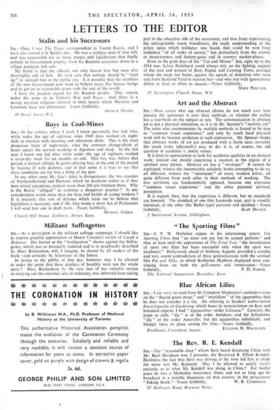Militant Suffragettes
SIR,—As a participant in the militant suffrage campaign, I should like to express grateful appreciation of Honor Croome's review of Laugh a Defiance. Her horror at the " hooliganism" shown against the Suffra- gettes, which was so heroically endured and is so graphically described by Mary Richardson, will, I imagine, be shared by all readers of the book—and certainly by historians of the future. In justice to the public of that day, however, may I be allowed to make the point that these displays of hostility were not the whole story ? Mary Richardson, by the very fact of her valuable service in carrying out the extremer acts of militancy, was debarred from taking part in the educative side of the movement, and thus from experiencing the unforgettable warm friendliness, the ready understanding of the policy upon which militancy was based, that could be won from audiences " of all ranks of society," but particularly from the crowds at street-corners and factory-gates and in country market-places.
Even in the grim days of the "Cat and Mouse" Act, right up to the 1914 war, Sylvia Pankhurst could always rely on the fighting support of the men and women 'of Bow, Poplar and Canning Town, amongst whom she made her home, against the squads of detectives who were sent from Scotland Yard to rearrest her—and who met with ignominious defeat at least as often as success.—Yours faithfully,


































 Previous page
Previous page